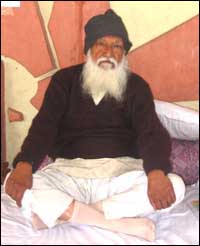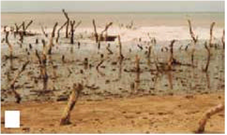/regions/ganga
Ganga
Press releases - Ganga river basin authority : SANDRP
Posted on 26 Feb, 2009 10:47 AM
A series of Press Releases from sources indicate the progress on the matter of the Ganga River Basin Authority. It makes for an informative read with a candid discussion in the comments section!
Ganga River Basin Authority for Comprehensive Management of the Ganga Basin
PIB Friday, February 20, 2009
Ministry of Environment and Forests
AUTHORITY ENSURES DEVELOPMENT REQUIREMENTS IN SUSTAINABLE MANNER ENSURING ECOLOGICAL FLOWS IN GANGA
The Government today announced the setting up of a National Ganga River Basin Authority. A statement to this effect was made in Parliament by Shri Namo Narain Meena, Minister of State in the Ministry of Environment & Forests. A Notification in this regard is also being issued by the Government.
Protesting broken promises: Dr. G.D. Agrawal resumes fast-unto-death
Posted on 20 Jan, 2009 12:19 PM
Images of a dying river, handwritten Press releases & more: Images of a Struggle on Flickr Charging the Government of India with not keeping its solemn commitment to keep the River Bhagirathi alive in its pristine stretch from Gangotri to Uttarkashi, Dr. G.D. Agrawal has resumed his fast-unto-death from Makar Sankranti Day, Wednesday, Jan 14, 2009.
You may recall that Prof. G. D Agrawal, former Professor & Dean of Students at IIT-Kanpur, the first Member-Secretary of India's Central PollutionControl Board and one of India's foremost environmental scientists went on a fast from June 13, 2008 to seek uninterrupted flow of River Bhagirathi (Ganga) in its natural form between Gangotri and Uttarkashi. His demand was very limited & specific, i.e., that the River Ganga be allowed to flow in its natural form in this 125 km stretch from its origin. This is the only stretch left now where the Ganga can still be seen in its pristine form. Dr. Agrawal requested the Govt. of India & the State Govt. of Uttarakhand to stop construction of Hydro Electric Projects (HEPs) in this stretch so that river flow was not diverted through tunnels that would destroy its ecology and its unique self-purifying properties. (diagrams are provided in the attached press release). Indians across the world got sensitized and lent their support to Prof Agrawal. Many wrote or met the PM of India and the CM of Uttarakhand and requested them to protect the Holy Ganga , whom Pandit Jawaharlal Nehru described as India's civilizational identity.
On the book shelf: Interlinking of Rivers in India, Issues and Concerns
Posted on 31 Aug, 2008 10:26 AM Key Features: Reviews the risks of inter-basin water transfers warns of critical disadvantages with India's proposed ILR plan offers viable less-risky solutions for water resource development. Inter-basin water transfers are complex human interventions on natural systems that can have profound adverse as well as beneficial social, economic and environmental implications. India's plan to interlink its rivers (ILR) and to transfer water may, according to one set of views, generate positive benefits through improved and expanded irrigation and may also contribute to flood and drought hazards mitigation for India, although the magnitudes are debatable. However, there are opposing views, in the context of India itself, that the interlinking plan is economically prohibitive, fraught with uncertainties, and has potential for disastrous and irreversible adverse after-effects. Water deficit can be reduced through improved water management without large scale engineering interventions. Moreover many of the rivers involved, particularly in the Himalayan component, are international and, therefore, the scheme has major implications for other riparians. Indeed, the planned transfer of water from the Ganges and Brahmaputra rivers will adversely impact Bangladesh socially, economically and environmentally---unless arrangements are made to maintain historical flows, which is unlikely to be feasible.
Key Features: Reviews the risks of inter-basin water transfers warns of critical disadvantages with India's proposed ILR plan offers viable less-risky solutions for water resource development. Inter-basin water transfers are complex human interventions on natural systems that can have profound adverse as well as beneficial social, economic and environmental implications. India's plan to interlink its rivers (ILR) and to transfer water may, according to one set of views, generate positive benefits through improved and expanded irrigation and may also contribute to flood and drought hazards mitigation for India, although the magnitudes are debatable. However, there are opposing views, in the context of India itself, that the interlinking plan is economically prohibitive, fraught with uncertainties, and has potential for disastrous and irreversible adverse after-effects. Water deficit can be reduced through improved water management without large scale engineering interventions. Moreover many of the rivers involved, particularly in the Himalayan component, are international and, therefore, the scheme has major implications for other riparians. Indeed, the planned transfer of water from the Ganges and Brahmaputra rivers will adversely impact Bangladesh socially, economically and environmentally---unless arrangements are made to maintain historical flows, which is unlikely to be feasible.
High Level Expert Group on the Bhagirathi river lacks required expertise
Posted on 28 Aug, 2008 10:05 PMAll is not well with the High Level Expert Group (HLEG) constituted on an order of the Government of India to determine the flow required to keep the Bhagirathi river 'alive and to ensure perennial environmental flow in the river'. It may be recalled that on June 30, 2008 the Government of India committed itself to "suitably ensure perennial environmental flow in all stretches of river Bhagirathi."This commitment was made in response to a representation of the Alumini Association of IIT- Kanpur to the Prime Minister of India requesting his intervention in the fast-unto-death undertaken by Dr. G.D. Agrawal , a former Dean of IIT-Kanpur -- to ensure the natural and uninterrupted flow of the Bhagirathi river between Gangotri and Dharasu (Uttarkashi). Subsequently the Ministry of Power, GoI, directed Shri R.S. Sharma, Chairman & Managing Director of NTPC, to constitute a high level expert group. The biggest problem with the HLEG is that it lacks the necessary scientific expertise to comprehensively address the issue. In a letter to Shri R.S. Sharma, rejecting his invitation to be a member of the HLEG, Dr G.D. Agrawal wrote, "Several members of the HLEG as constituted (including its Chairman) fall extremely short on any sort of expertise on river ecology and environmental flows...The commitment of most proposed members towards conservation of Bhagirathi Gangaji as the mother of India's faith, unity and culture is also questionable and I cannot afford to provide credibility to its deliberations and conclusions by being an ordinary member of the group."
Invitation for joining URAN PSI group
Posted on 18 May, 2008 10:48 PMSeveral threats have emerged in recent years to the pristine Himalayan rivers of Uttarakhand. These include: (i) the proposed construction of 220 dams (ii) the drying up of rain fed rivers due to deforestation and deforestation of their catchments (iii) release of untreated sewage from river side towns and habitations and (iv) illegal sand mining of river beds.
Prof.G. D. Agrawal's satyagraha against the construction of dams on the Bhagirathi River
Posted on 17 May, 2008 09:08 AM
Pained by the unrelenting destruction of the Ganga river, especially by a series of dams in its upper reaches, Dr G.D. Agrawal, India's pre-eminent environmental quality scientist and a legendary Professor (and HoD) of Civil & Environmental Engineering at IIT-Kanpur. (Access:Biography Sketch Here) has decided to go on a fast-unto-death to oppose its continuing desecration. His conviction that we are staring at an unprecedented ecological and cultural catastrophe comes from his powerfully logical mind. Critique on proposed dams on Bhagirathi River. Access here: Critique on Dams
Environmental flows for Indian rivers:Need for a discussion to consider the health of the riverine ecosystems
Posted on 24 Apr, 2008 11:58 PMIndia is facing a water crisis in nearly all the sectors. Fortunately or unfortunately, measures taken by the related authorities to combat the crisis often depends on the amount of 'noise' made by the relevant stakeholders. It is no wonder then, that the urban India, and especially the rich and the powerful in urban India, seldom have to face problems related to water scarcity, water quality or the sheer inequity in distribution. On the other hand, weaker the stakeholder, more severe are his ( rather 'her') problems. Marginal farmers, tail enders in a canal network, rural and urban poor, especially children and women, stand testimony to this situation. We all agree to this, right? 
Godavari delta, destruction of mangroves
But aren't we forgetting the the weakest, and in some ways, the strongest, of all the stakeholders? How about the ecosystem of the river itself??
Sankat Mochan Foundation and the Ganga
Posted on 15 Dec, 2007 07:31 AM How polluted are our rivers? Assessments vary, but all point to serious contamination.
How polluted are our rivers? Assessments vary, but all point to serious contamination.
More on Discovery Channel's "Ganges" series
Posted on 23 Nov, 2007 01:19 AM Madhu Ramaswamy follows up after several people expressed their appreciation of this series on the blog https://www.indiawaterportal.org/blog/index.php/2007/10/28/ganges-three-part-series-on-the-discovery-channel/ Our posting about Discovery Channel's television series 'Ganges' has attracted several responses from readers, some of whom are under the mistaken impression that we are associated with the series. We would like to clarify that India Water Portal was merely drawing viewers' attention to this highly interesting series. We are not (alas!) involved in its production. We'd like to hear from blog readers their thoughts about the series. We're also trying to contact Discovery ourselves. Viewers who wish to send in their comments on the series could also get in touch with Discovery Channel directly at this link: (http://www.discoverychannel.co.in/india/contact.htm) For an understanding of our role and activities in the water sector, please see our weblink: https://www.indiawaterportal.org/about/ According to the Discovery Channel website, the series will continue to air on Wednesday, Thursday and Saturday next week.
Madhu Ramaswamy follows up after several people expressed their appreciation of this series on the blog https://www.indiawaterportal.org/blog/index.php/2007/10/28/ganges-three-part-series-on-the-discovery-channel/ Our posting about Discovery Channel's television series 'Ganges' has attracted several responses from readers, some of whom are under the mistaken impression that we are associated with the series. We would like to clarify that India Water Portal was merely drawing viewers' attention to this highly interesting series. We are not (alas!) involved in its production. We'd like to hear from blog readers their thoughts about the series. We're also trying to contact Discovery ourselves. Viewers who wish to send in their comments on the series could also get in touch with Discovery Channel directly at this link: (http://www.discoverychannel.co.in/india/contact.htm) For an understanding of our role and activities in the water sector, please see our weblink: https://www.indiawaterportal.org/about/ According to the Discovery Channel website, the series will continue to air on Wednesday, Thursday and Saturday next week.